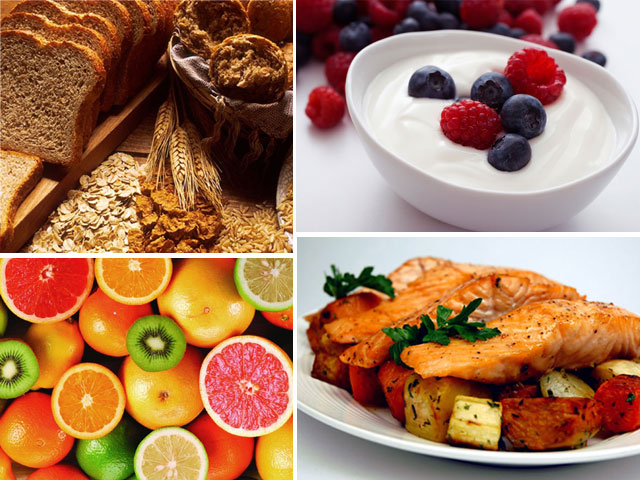
The basic principles of healthy eating during pregnancy are getting plenty of fruits, vegetables, lean protein, whole grains and healthy fats.
Along with the basics, there are some foods that are necessary to eat that protect your health and ensure your baby is getting enough nutrients to grow.
1. Whole Grains
 PHOTO: DAILYTOAST
PHOTO: DAILYTOASTAccording to Alarabiya.net, whole grains are essential for you and your baby's health. Whole grain is not only rich in fiber but has a list of nutrients, including vitamin E, selenium and iron.
During pregnancy, it is essential to keep your digestive system healthy and to avoid constipation, which is why you need fiber.
A higher intake of fiber also helps to prevent glucose intolerance which may lead to gestational diabetes – diabetes during pregnancy.
It is easy to add whole grains to your diet - oatmeal, brown rice and whole wheat bread are all good sources.
Cheaper healthy food could save millions of lives: study
2. Beans:
 PHOTO: YOUCANGROUP.IT
PHOTO: YOUCANGROUP.ITBeans are packed with nutrients. Besides being rich in fiber, all beans provide key nutrients such as iron, folic acid, calcium and zinc.
Your body uses iron to make hemoglobin, a protein that carries oxygen in your blood to your tissues. If you don’t get enough iron, you might be fatigued and more susceptible to infection and your baby might not grow as much as he should.
Beans are also incredibly simple to incorporate into your diet. You can grind lentils to make soup, or add black beans to a salad, and even make hummus with chickpeas.
3. Citrus Fruits:
 PHOTO: MYTABIB.COM
PHOTO: MYTABIB.COMCitrus fruits such as oranges, kiwis, lemons and grapefruits are the perfect sources of vitamin C, which helps your body absorb iron, - a key mineral during pregnancy. It is important to include at least one citrus fruit into your diet each day.
10 health mistakes all women make at least once
4. Salmon:
 PHOTO:CBC.CA
PHOTO:CBC.CASalmon is a good source of Omega 3 which is a healthy fat. Healthy fats are good for your baby's brain, eyes and central nervous system, and so are essential to have during pregnancy.
Not only does Salmon have Omega 3, it's also a good source of protein and calcium.
Even though salmon is relatively low in mercury (which can be harmful to your baby's development), it is important to be careful with how much you have. The FDA recommends no more than 12 oz. of seafood per week. A deck of cards makes a good equivalent for a 3 ounce serving size of fish.
The NHS recommends eating two portions of fish a week, one of which should be oily fish such as salmon, sardines or mackerel.
You should avoid eating shark, swordfish or marlin when pregnant.
5. Yogurt:
 PHOTO: JUICING-FOR-HEALTH.COM
PHOTO: JUICING-FOR-HEALTH.COMYogurt is a great source of calcium, an even better source than milk. Calcium helps your bones stay intact while supporting your baby in developing strong bones and teeth. It also supports circulation, muscles, and the nervous system.
If you don’t get enough calcium from your diet, the calcium will be taken from your bones and go to your baby.
Choose low-fat varieties of milk and yogurt wherever possible, such as semi-skimmed or skimmed milk, low-fat lower-sugar yoghurt and reduced-fat hard cheese. The NHS suggests two to three portions a day.
6 foods you shouldn’t consume after 30
6. Green leafy vegetables:

Spinach, romaine, kale, and mint are packed with nutrients. Leafy greens contain the vitamins A, C, K and folic acid and the minerals calcium, iron, and potassium. Due to their high fiber content, these vegetables may also help prevent constipation.
Add these greens to your salads and sandwiches for a healthier meal.

1721377568-0/BeFunky-collage-(18)1721377568-0-165x106.webp)





1725446940-0/Untitled-design-(16)1725446940-0-270x192.webp)















COMMENTS
Comments are moderated and generally will be posted if they are on-topic and not abusive.
For more information, please see our Comments FAQ